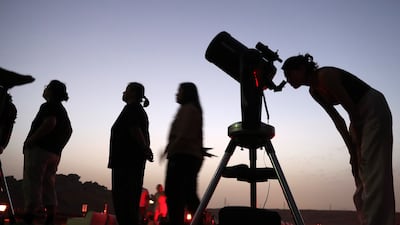A dazzling meteor shower is expected to light up the UAE's night skies on Tuesday and into the early hours of Wednesday.
The Orionids meteor shower, which typically peaks around this time of the year, is due to take place during a moonless night, meaning visibility could be good.
The showers are known for their speed and beauty, with meteors entering Earth’s atmosphere at nearly 66km per second and leaving long, glowing trails.
“A moonless night would be perfect for catching some meteors on the night that the Orionids peak,” Khadijah Ahmed, operations manager at Dubai Astronomy Group, told The National.
“The Orionids is one of the most beautiful meteor showers of the year, fast and bright.”
The meteors are caused by debris from Halley’s Comet, which last appeared in 1986 and will be visible from Earth again in 2061.

Comets shed tiny fragments of dust and rock as they travel around the Sun.
When Earth crosses Halley Comet’s trail of debris, these particles burn up in the atmosphere, producing the meteors seen each October.
The Dubai Astronomy Group is hosting an observation event at Al Qudra Desert on October 21 from 10pm to 2am.
There will be stargazing through telescopes, including a closer look at the Orionids, and educational talks by astronomy experts. Tickets cost Dh150 for adults and Dh120 for children.
The showers are part of a busy season of celestial events, with a lunar eclipse in September, the Perseids meteor shower in August and the year’s first supermoon last week.
The next supermoon, Beaver Moon, will appear on November 5. It is expected to be the largest of the year. The Leonids meteor shower will peak on November 17 and 18.
These will be followed by the year's final supermoon, the Cold Moon, appearing on December 4.
Full moons are named after traditional seasonal changes or activities, such as hunting in autumn, beaver trapping in early winter and cold weather in December.
The season will close with the Geminids meteor shower on December 13 and 14. The Geminids are among the most reliably visible showers, and can peak with 120 meteors an hour.



